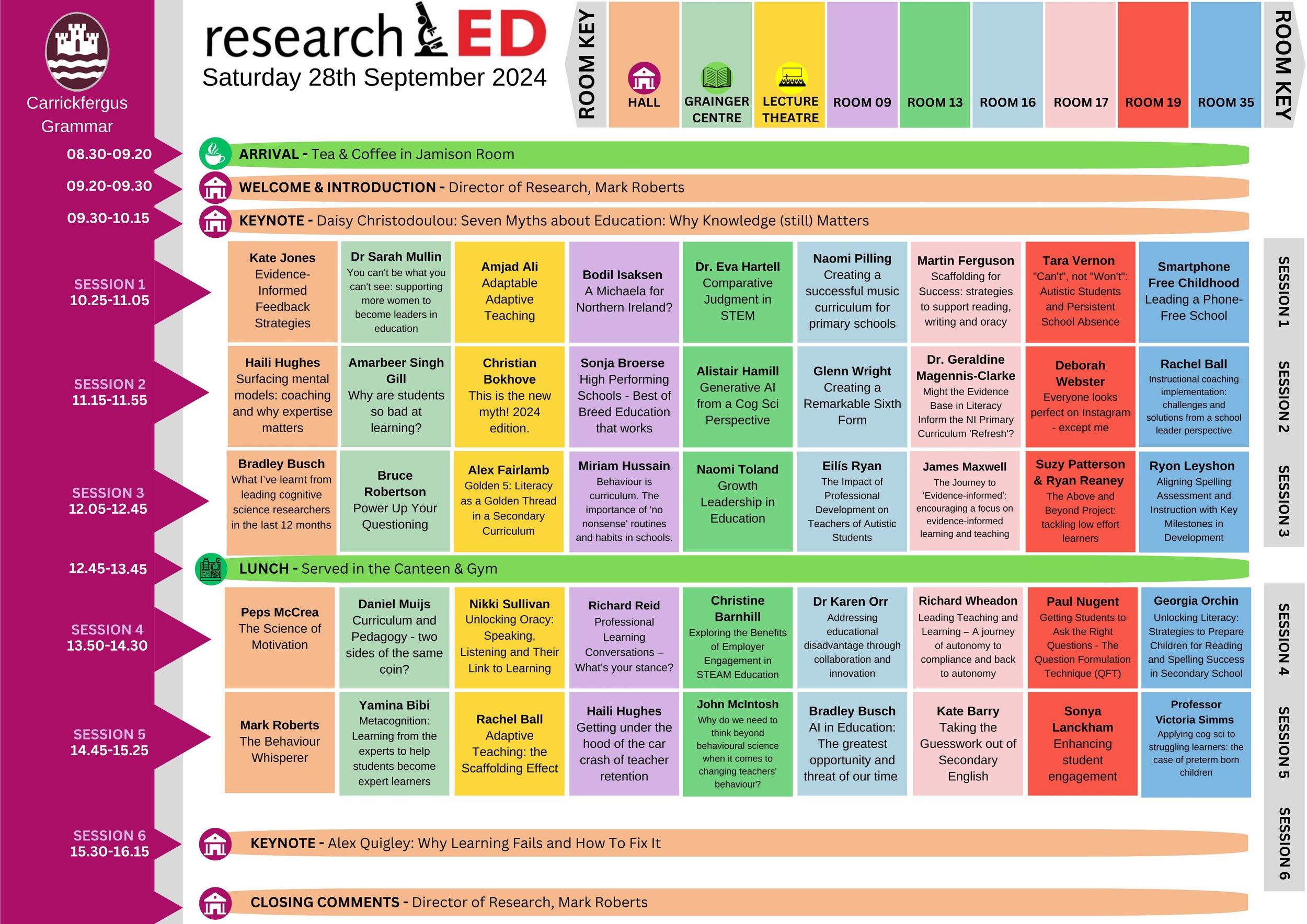researchED Belfast
There is no better CPD for a teacher than attending a researchED conference: lots of 40-minute talks on teaching and learning given by fellow classroom practitioners, lecturers and experts. I’ve been to several and have co-organised two (this on 2022 in Dublin), and last Saturday headed North for the first one in Northern Ireland at Carrickfergus Grammar School.
Sincere thanks to Mark Roberts and his team for organising the day: I know how much work is involved.
Straight into the presentations (a feature of rED is how difficult it is to make choices of the elective slots):
Daisy Christodoulou also gave the opening keynote at rED Dublin 2019, and revisited that talk with ‘Seven Myths about Education: why knowledge (still) matters’, and why those myths are still widely circulating. Some seem particularly rooted in third-level institutions and, sadly, teacher-training courses. The knowledge-light curriculum model in Finland and Scotland has damaged those country’s educational systems, and unfortunately the official narrative in the Republic of Ireland continues to push the idea of a skills-based approach. As Daisy said, the pathway should be knowledge, with skills as the end result. My comments on her book Teachers vs Tech: the case for an ed tech revolution.
Amjad Ali is a highly-entertaining speaker; below the laughs was real substance in his talk on ‘Adaptable Adaptive Teaching’, focussing on how clear we must be on guiding pupils to learning outcomes. We need to help pupils who need that help disproportionately. I’ll be buying his book A Little Guide for Teachers: SEND in Schools.
Haili Hughes spoke on ‘surfacing mental models’ in coaching. I’m always interested in the best ways to help teachers develop, and am involved in this area with English teachers in Ireland. She quoted Jim Knight on how a coach never withholds their expertise.
Bradley Busch has us try (hopelessly) to complete a basic drawing of a bicycle. He focussed on maximising cognitive engagement in pupils and the power of feedback (up to a third of feedback engagements might actually hinder progress, something that every adult in the workplace will recognise). He ended by looking at the faults built into the Powerpoint experience for teachers, including the Transient Information Effect.
Peps Mccrea looked at motivation, and how environmental features can reduce it. There are tweaks which can improve attention, and building automated routines can allow pupils to concentrate on the central things of their learning. These small tweaks when scaled up across a staff can be extremely powerful. I recommend signing up to his Evidence Snacks email. My comments on his book Motivated Teaching.
I went back to Bradley Busch a second time for his talk on AI and education (opportunity and threat), especially in the light of my collection of thoughts on Substack recently (English Teaching, AI and the Thermostatic Principle). As he rightly say, if we use AI it must be more efficient or more effective or preferably both than our previous practice. He repeated the question I asked in that Substack post, what problem do I need solving? As I wrote there, I am suspicious of using it for idea-generation by pupils. He showed how learning styles has had a dismaying re-blossoming since ChatGPT appeared: the service is just picking up what it has been trained on rather than what is accurate.
Alex Quigley gave the closing keynote on ‘Why Learning Fails and how to fix it’: my comments on his recent book on this topic. He looked at ways in which he felt he may have failed one of his own pupils years ago as an English teacher. Lots more on his website.
You won’t get a more stimulating day as a teacher than a researchED conference, so sign up if there’s one near you (and it’s cheap!). They’re all run by volunteers, full of friendliness, and send you back to your school invigorated.
